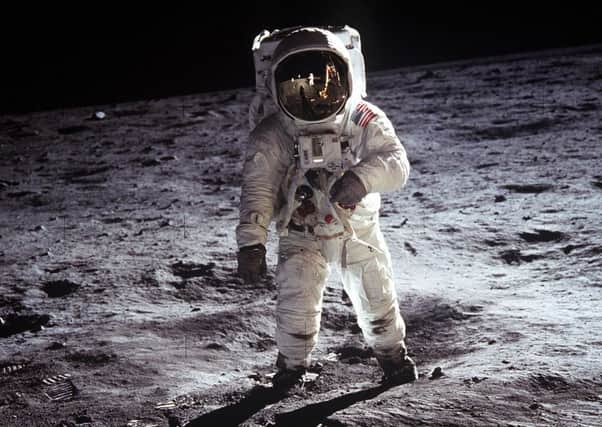All the Moon’s a stage at this year’s Edinburgh Fringe


Instead, they use our nearest neighbour as a symbol. Whether talking about impossible ambition or fairytale mysticism, they make the moon about life down here.
Take David Greig. Two decades ago, the Scottish playwright wrote about the Russian space programme in The Cosmonaut’s Last Message To The Woman He Once Loved In The Former Soviet Union. In it, he imagined two cosmonauts lost in orbit around a world that was changing unrecognisably. Their isolation became a metaphor for the everyday communication breakdown happening beneath them. It’ll be fascinating to see what metaphors Greig plays with when he goes even deeper into space in his adaptation of the sci-fi novel Solaris at Edinburgh’s Royal Lyceum (12 September–5 October).
Advertisement
Hide AdOr consider the case of the Canadian director Robert Lepage. Although his 1999 play Far Side Of The Moon featured some startling space imagery, it was really an exploration of worldly success and failure. His inspiration was a sense he had “been to the moon” in his early theatrical hits. In this, he saw a kindred spirit in Apollo 11 astronaut Buzz Aldrin, who suffered depression, alcoholism and marriage breakup after his return from the moon.
On the Edinburgh Fringe, where the moon landing crops up repeatedly as a metaphor, Aldrin is a touchstone for similar reasons in Buzz (Summerhall, 31 July–25 August), the story of a talented singer who opts to be a gardener. An adaptation of a novel by Johan Harstad, the play uses the astronaut to symbolise a man who puts in the work but gets none of the glory.
Aldrin was not the first to suffer the consequences of such an extraordinary accomplishment. It had already proved a problem for Yuri Gagarin, whose earthly celebrity went hand in hand with heavy drinking and depression. Written from the perspective of today’s era of Instagram influencers and YouTube vloggers, Space Junk: A Soviet Musical (The Space @ Surgeons Hall, 2–17 August) looks at how the son of Russian peasants coped with his new-found fame.
Still behind the iron curtain, Valentina Tereshkova is the inspiration behind three Fringe shows about female accomplishment. The cosmonaut who spent three days in solo orbit in 1963 has put fuel in the rockets of Acting Coach Scotland’s Chaika: First Woman in Space (The Space on North Bridge, 2–24 August) and two children’s shows, Frozen Charlotte’s Valentina’s Galaxy (Royal Botanic Garden, 3–18 August) and Ditto Theatre’s Rocket Girl (Underbelly, Cowgate, 1–25 August). “Rocket Girl resonates with children on a basic level,” says Ditto’s Polly Bycroft-Brown, “but it also emotionally affects their parents because of those generations that were told women had to be nurses, secretaries or wives.”
These achievements were not the only technological triumphs of the 1960s. The live television broadcast of the moon landing was an unprecedented feat in its own right. That’s why Apollo 11 (Greenside @ Infirmary Street, 2–10 August) by the University of East Anglia’s Ned Fleeman Theatre Company recreates that remarkable night in 1969 and focuses on the audience watching at home.
Wearyingly, there are still those who persist in believing it didn’t happen at all, a conspiracy theory satirised in two shows. The musical One Giant Leap (Space on the Mile, 12–24 August) imagines three actors and a Hollywood filmmaker desperately trying to create a lunar mock-up in the Nevada desert in time for the countdown. “It’s the making of a faking and we’re going to put on a show,” they sing, as fake news and showbiz collide.
Advertisement
Hide AdStrickland Productions has alighted on the same idea for Apollo: Take 111 (Zoo Southside, 2–26 August), in this case focusing on a small-town government employee who gets the job of faking the landing to beat the communists, despite being singularly unqualified. Tom Proffitt’s farce questions our willingness to disbelieve historical fact, a theme also explored in Barrel Organ’s Conspiracy (Underbelly, Cowgate, 1–25 August).
The space age, in other words, gives theatre-makers an opportunity for human reflection, feminist thought and satirical comment. Or sometimes it’s just a chance for a laugh. Paying a surreal tribute to the 1969 landing, comedian Olaf Falafel puns his way through It’s One Giant Leek for Mankind (Laughing Horse @ the Pear Tree, 2–11 August), a children’s show about a stray seed that turns the barren satellite into a vegetable patch. “I’m pretty sure this isn’t what happened but it’s brilliantly funny,” says none other than spaceman Tim Peake. - Mark Fisher